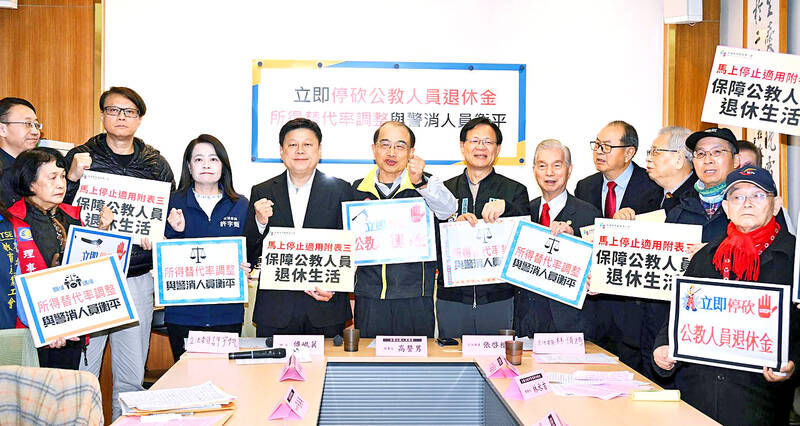The National Civil Servant Association yesterday demanded that the government roll back policies on educators’ and civil servants’ retirement income replacement ratios and adjust their ratios to match the newly amended replacement ratio ceiling for police officers and firefighters.
The Legislative Yuan on Tuesday passed amendments to the Police Personnel Management Act (警察人員人事條例), raising the maximum income replacement ratio to 80 percent for police officers, firefighters, and members of the coast guard and National Air Service Corps serving 36 years or more.
The pension reforms of 2018 had initially targeted laborers, educators, civil servants and the military, but removed laborers and the military from the reforms, association chairman Kao Shih-nan (高誓男) told a news conference yesterday.

Photo: Lin Hsin-han, Taipei Times
Removing police and firefighters from the reforms while stating that the Labor Pension Fund receiving additional subsidies “was a reform” shows that the reforms are unjust and undermine educators’ post-retirement security, he said.
The reforms have increased vocational confrontation and introduced social discord, he said.
The jobs of civil servants and educators provide social stability and smooth governance, and their pension should see a reasonable guarantee, instead of being reduced year on year, he said, urging the government to review the pension system for the military, civil servants and educators to ensure equality.
A reasonable income replacement ratio would ensure that civil servants and educators would have enough to maintain basic needs post-retirement, he added.
Chinese Nationalist Party (KMT) Legislator Fu Kun-chi (傅崑萁), who attended the news conference, said the nation would only improve if top-quality talent entered its service.
No one of decent education would want to work in a government where the state bullies its civil servants, and the government stands to suffer if it is managed by officials of inferior quality, he said.
The government has the wherewithal to extend good care to its public servants, he said.
If the ruling Democratic Progressive Party (DPP) continues to reduce civil servants’ pensions citing the imminent insolvency of the pension fund, it is evident that the party is not equipped to rule the country and another party should be given an opportunity, he said.
Taiwan People’s Party Legislator Chang Chi-kai (張啟楷) said there is a significant investment-return rate for the pension fund, and the government’s finances are in the green year-on-year, demonstrating full capability to increase the retirement income replacement ratio for civil servants and educators.
The government should reverse its reduction of civil servant and educator retirement income replacement ratios, and amend laws to guarantee the quality of post-retirement life for these two groups, Chang said.
Honorary chairman of the Joint Association for Civil Servants, Educators, Military, Police and Firefighters Liu Sheng-liang (劉盛良) said public servants and educators must receive fair treatment regarding their pensions.

An essay competition jointly organized by a local writing society and a publisher affiliated with the Chinese Communist Party (CCP) might have contravened the Act Governing Relations Between the People of the Taiwan Area and the Mainland Area (臺灣地區與大陸地區人民關係條例), the Mainland Affairs Council (MAC) said on Thursday. “In this case, the partner organization is clearly an agency under the CCP’s Fujian Provincial Committee,” MAC Deputy Minister and spokesperson Liang Wen-chieh (梁文傑) said at a news briefing in Taipei. “It also involves bringing Taiwanese students to China with all-expenses-paid arrangements to attend award ceremonies and camps,” Liang said. Those two “characteristics” are typically sufficient

A magnitude 5.9 earthquake that struck about 33km off the coast of Hualien City was the "main shock" in a series of quakes in the area, with aftershocks expected over the next three days, the Central Weather Administration (CWA) said yesterday. Prior to the magnitude 5.9 quake shaking most of Taiwan at 6:53pm yesterday, six other earthquakes stronger than a magnitude of 4, starting with a magnitude 5.5 quake at 6:09pm, occurred in the area. CWA Seismological Center Director Wu Chien-fu (吳健富) confirmed that the quakes were all part of the same series and that the magnitude 5.5 temblor was

The brilliant blue waters, thick foliage and bucolic atmosphere on this seemingly idyllic archipelago deep in the Pacific Ocean belie the key role it now plays in a titanic geopolitical struggle. Palau is again on the front line as China, and the US and its allies prepare their forces in an intensifying contest for control over the Asia-Pacific region. The democratic nation of just 17,000 people hosts US-controlled airstrips and soon-to-be-completed radar installations that the US military describes as “critical” to monitoring vast swathes of water and airspace. It is also a key piece of the second island chain, a string of

The Central Weather Administration has issued a heat alert for southeastern Taiwan, warning of temperatures as high as 36°C today, while alerting some coastal areas of strong winds later in the day. Kaohsiung’s Neimen District (內門) and Pingtung County’s Neipu Township (內埔) are under an orange heat alert, which warns of temperatures as high as 36°C for three consecutive days, the CWA said, citing southwest winds. The heat would also extend to Tainan’s Nansi (楠西) and Yujing (玉井) districts, as well as Pingtung’s Gaoshu (高樹), Yanpu (鹽埔) and Majia (瑪家) townships, it said, forecasting highs of up to 36°C in those areas